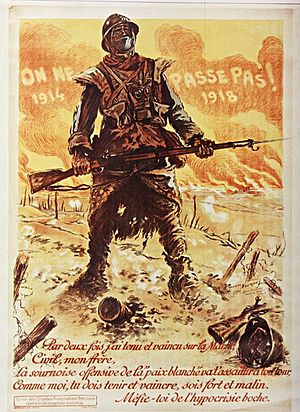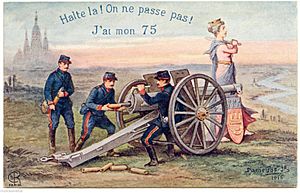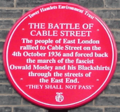They shall not pass facts for kids

"They shall not pass" (French: Ils ne passeront pas; Romanian: Pe aici nu se trece; Spanish: No pasarán) is a slogan, most notably used by France in World War I, to express a determination to defend a position against an enemy. It was also used during the Spanish Civil War by the Republican faction.
Origin
The widespread use of the slogan originates from the 1916 Battle of Verdun in the First World War when French General Robert Nivelle urged his troops not to let the enemy pass. The simplified slogan of "they shall not pass" appeared on French war propaganda posters, most notably by French artist Maurice Neumont in the last year of the war after the Allied victory at the Second Battle of the Marne.
Later during the First World War, the slogan was used by Romanian soldiers during the Battle of Mărășești, with the Romanian translation of the phrase being "Pe aici nu se trece", translating as "One does not pass through here".
The slogan was adopted on uniform badges by French units manning the Maginot Line.
Later use
French socialist politician Léon Blum (SFIO), in 1934, used this sentence "Ils ne passeront pas !" against the Ligue's demonstration of the 6 February. Ils ("they") designated the fascist protesters.
It was also used during the Spanish Civil War, this time at the siege of Madrid by Dolores Ibárruri Gómez, a member of the Communist Party of Spain, in her famous "No pasarán" speech on 18 July 1936. The leader of the Nationalist forces, Generalísimo Francisco Franco, upon gaining Madrid, responded to this slogan by declaring "Hemos pasado" ("We have passed").
"¡No pasarán!" was used by British anti-fascists during the October 1936 Battle of Cable Street, and is still used in this context in some political circles. It was often accompanied by the words nosotros pasaremos (we will pass) to indicate that communists rather than fascists will be the ones to seize state power.
The phrase was brought to the public consciousness again following action in December 1943 by French-Canadian officer Paul Triquet of the Royal 22e Regiment; his action included his use of Nivelle's phrase "to win a key objective at Ortona, Italy, in the face of overwhelming German opposition."
In the 1980s, the phrase ¡No pasarán! was a theme in the civil wars in Central America, particularly in Nicaragua. Nicaragua no pasarán is also the title of a 1984 documentary by David Bradbury about the events in Nicaragua that led to the overthrow of Somoza's dictatorship.
Gallery
-
On ne passe pas!, French medal for the Battle of Verdun
See also
 In Spanish: No pasarán para niños
In Spanish: No pasarán para niños
- Awake iron!
- Molon labe
- Order No. 227 (Stalin's "Not one step back" order)
- Venceremos
- Raised fist
- List of last stands





